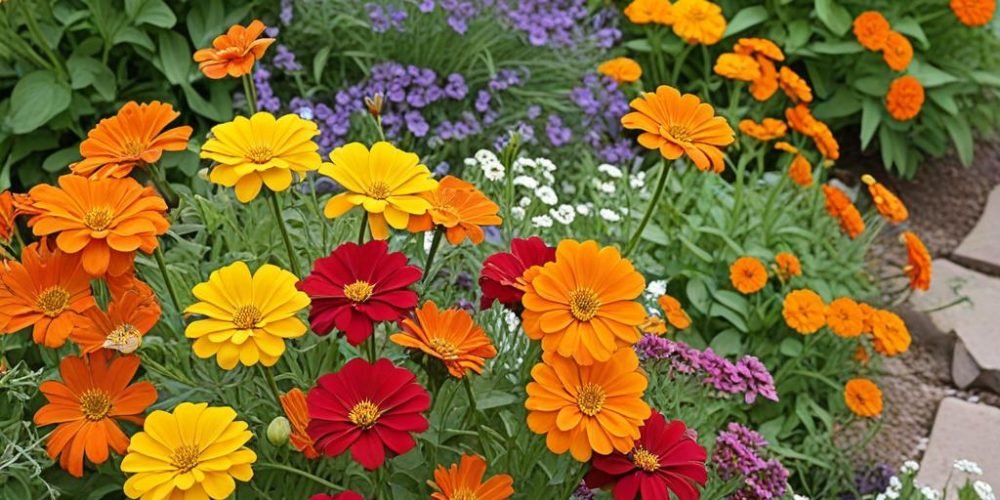
Starting an organic flower garden can be an exciting and rewarding experience, especially for beginner gardeners. Choosing the right flowers is essential for success, as some varieties are easier to grow and maintain than others. Here’s a guide to the best organic flowers for beginners, ensuring a vibrant and thriving garden with minimal effort.
1. Marigolds (Tagetes spp.)
Why They’re Great for Beginners:
- Low Maintenance: Marigolds are hardy and can tolerate a variety of soil conditions.
- Pest Control: They naturally repel pests like nematodes and aphids, making them an excellent companion plant.
- Continuous Blooms: Marigolds bloom prolifically from spring to frost.
Growing Tips:
- Sunlight: Plant in full sun for best results.
- Soil: They thrive in well-drained soil.
- Watering: Water regularly but allow the soil to dry out between waterings.
2. Zinnias (Zinnia elegans)
Why They’re Great for Beginners:
- Easy to Grow: Zinnias are very easy to grow from seeds and establish quickly.
- Long Blooming Season: They bloom all summer long and come in a variety of vibrant colors.
- Attract Pollinators: Zinnias attract bees and butterflies, supporting your garden’s ecosystem.
Growing Tips:
- Sunlight: Plant in full sun.
- Soil: They prefer well-drained soil.
- Watering: Water regularly, especially during dry spells, but avoid getting the foliage wet to prevent mildew.
3. Sunflowers (Helianthus annuus)
Why They’re Great for Beginners:
- Fast-Growing: Sunflowers grow quickly and can reach impressive heights.
- Pollinator Friendly: They attract bees and birds.
- Drought Tolerant: Once established, sunflowers are quite drought-tolerant.
Growing Tips:
- Sunlight: Full sun is essential.
- Soil: Plant in well-drained soil.
- Watering: Water deeply but infrequently.
4. Cosmos (Cosmos bipinnatus)
Why They’re Great for Beginners:
- Tough and Resilient: Cosmos are very resilient and can thrive in poor soil conditions.
- Long Blooming: They bloom from summer to fall.
- Self-Seeding: Cosmos will often reseed themselves, providing flowers year after year with little effort.
Growing Tips:
- Sunlight: Full sun is best.
- Soil: They tolerate poor soil but ensure it’s well-drained.
- Watering: Water sparingly; overwatering can lead to weak stems.
5. Calendula (Calendula officinalis)
Why They’re Great for Beginners:
- Easy to Grow: Calendula is easy to grow from seeds and adapts well to different conditions.
- Medicinal Properties: Known for its medicinal properties, calendula can be used in homemade salves and teas.
- Cold Hardy: It can tolerate cooler temperatures, extending the growing season.
Growing Tips:
- Sunlight: Plant in full sun to partial shade.
- Soil: Prefers well-drained, moderately rich soil.
- Watering: Keep soil consistently moist but not waterlogged.
6. Nasturtiums (Tropaeolum majus)
Why They’re Great for Beginners:
- Edible Flowers: Both the flowers and leaves are edible, adding a peppery flavor to salads.
- Pest Deterrent: They deter pests like aphids and squash bugs.
- Easy to Grow: Nasturtiums thrive on neglect and don’t require much fertilization.
Growing Tips:
- Sunlight: Full sun to partial shade.
- Soil: Prefer poorer soils; too much fertility leads to fewer flowers.
- Watering: Water regularly but allow the soil to dry between waterings.
7. Sweet Alyssum (Lobularia maritima)
Why They’re Great for Beginners:
- Ground Cover: Sweet alyssum is an excellent ground cover and can fill in gaps in the garden.
- Fragrant Blooms: They produce a lovely, sweet fragrance.
- Attracts Beneficial Insects: Attracts pollinators and beneficial insects like hoverflies.
Growing Tips:
- Sunlight: Full sun to partial shade.
- Soil: Well-drained soil is ideal.
- Watering: Keep the soil consistently moist, especially during hot weather.
8. Lavender (Lavandula spp.)
Why They’re Great for Beginners:
- Low Maintenance: Lavender is drought-tolerant and requires little care once established.
- Fragrant and Versatile: Known for its fragrance, lavender can be used in cooking, crafts, and aromatherapy.
- Attracts Pollinators: It attracts bees and butterflies.
Growing Tips:
- Sunlight: Plant in full sun.
- Soil: Requires well-drained, sandy soil.
- Watering: Water sparingly; lavender prefers dry conditions.
Starting an organic flower garden doesn’t have to be daunting, especially with these beginner-friendly flowers. By choosing easy-to-grow varieties like marigolds, zinnias, sunflowers, and others, you can create a beautiful, low-maintenance garden that supports a healthy ecosystem. Embrace the joy of gardening with these resilient and rewarding flowers, and watch your garden flourish with minimal effort. Happy gardening!
